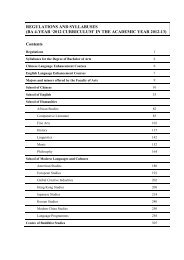Bachelor of Arts (BA) - The University of Hong Kong
Bachelor of Arts (BA) - The University of Hong Kong
Bachelor of Arts (BA) - The University of Hong Kong
Create successful ePaper yourself
Turn your PDF publications into a flip-book with our unique Google optimized e-Paper software.
297POLI0017.Government and business (6 credits)This course explores the interplay between government and business within major East Asian countriesand how regional economic dynamism is shaping regional international relations in East Asia. <strong>The</strong>theoretical focus is on how government policy affects the market and how economic forces shapegovernment political decisions. At the international level, it seeks to examine the political basis <strong>of</strong> regionaleconomic integration and the economic foundation <strong>of</strong> international political cooperation in East Asia. Issueareas for this course include: the economic dynamism in East Asia, sub-regional economic growth circles,patterns <strong>of</strong> trade and investment, APEC, and security challenges and economic regionalism.POLI0018.<strong>The</strong> Japanese way <strong>of</strong> politics (6 credits)<strong>The</strong> Japanese political system before the early 1990s had been described as 'karaoke democracy.' Justlike in a karaoke stage whereby visible singers come and go but songs remain the same, prime ministersand cabinets changed in the Japanese political stage yet policy directions remained largely unchanged.Nonetheless, the 'karaoke democracy' has become a thing <strong>of</strong> past. Since the early 1990s, Japanesepolitics has been in a state <strong>of</strong> flux. <strong>The</strong> Liberal Democratic Party (LDP), which had dominated Japanesepolitics for more than 38 years, collapsed in 1993. <strong>The</strong> Japan Socialist Party (JSP), the once mainopposition party in the country, has increasingly faded into oblivion. After the reform <strong>of</strong> the electoralsystem in recent years, there has emerged a genuine multi-party system whereby frequent inter-partyalignment and realignment becomes the order <strong>of</strong> the day. <strong>The</strong> national bureaucracy, reputed for itsinfluential status, has come under severe public criticism and political attacks in the wake <strong>of</strong> prolongedeconomic slump.<strong>The</strong> main questions to be addressed in this course include: What are the main characteristics <strong>of</strong> theJapanese democracy? How does it differ from other liberal democracies? Why had the LDP maintainedits long-lasting rule between 1955 and 1993? What is the role <strong>of</strong> the bureaucracy in Japanese politics?How does the business community exert its political influence? What are the main characteristics <strong>of</strong> theJapanese political culture? How do ordinary Japanese and social groups exercise their political power?What are the main sources <strong>of</strong> political change in the 1990s? What contributed to the end <strong>of</strong> the LDP'sdominance in national politics? What are the main changes in the electoral system? How do theJapanese political culture and domestic politics affect Japanese foreign relations?POLI0019.<strong>Hong</strong> <strong>Kong</strong> and the world (6 credits)<strong>Hong</strong> <strong>Kong</strong>'s interactions with the outside world are critical to its role as a major international city andwill shape its ability to position itself as the leading gateway to the mainland <strong>of</strong> China. While <strong>Hong</strong><strong>Kong</strong>'s ‘foreign affairs portfolio’ is controlled by China, <strong>Hong</strong> <strong>Kong</strong> retains considerable autonomy inshaping its international destiny. What global course should <strong>Hong</strong> <strong>Kong</strong> leaders chart? This class willexamine the special administrative Region's special international status, the political dimensions <strong>of</strong> itsinternational economic-cultural-social links, and its complex identity as a Chinese world city.Moreover, it intends to explore the multiple and variegated external linkages between <strong>Hong</strong> <strong>Kong</strong> andthe world within the context <strong>of</strong> globalization. Prominent members <strong>of</strong> the <strong>Hong</strong> <strong>Kong</strong> community willbe invited to share their perspectives on <strong>Hong</strong> <strong>Kong</strong>'s track record in facing the challenges andopportunities associated with today's highly interdependent global system. By exploring these themeswith reference to the changing nature <strong>of</strong> the global system, the course hopes to provide students within-depth knowledge <strong>of</strong> <strong>Hong</strong> <strong>Kong</strong>'s international links and enhance their understanding <strong>of</strong> the complexproblems <strong>of</strong> global governance.
















